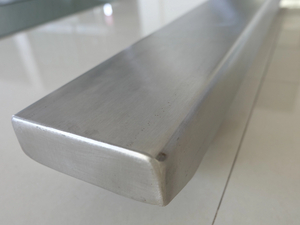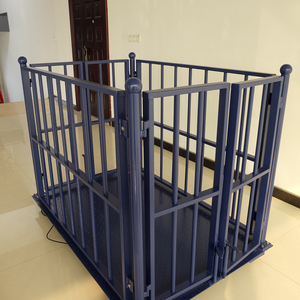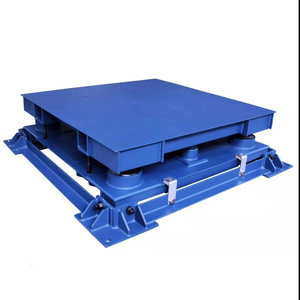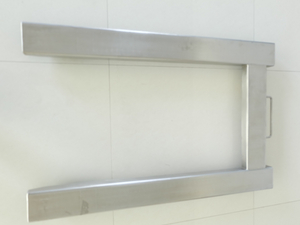
Weighing scales are essential tools in construction projects, playing a critical role in ensuring accuracy, efficiency, and safety. From the initial planning stages to the completion of a project, scales are used to measure materials, monitor equipment loads, and manage waste. This comprehensive exploration delves into the various applications of weighing scales in construction and highlights their significance in maintaining project integrity and meeting regulatory standards.
Precision in Material Measurement
Accurate measurement of construction materials is crucial for the success of any project. Weighing scales ensure that the correct quantities of materials such as cement, sand, gravel, and steel are used, which is essential for maintaining the structural integrity of buildings and other structures.
Concrete Production
In concrete production, precise measurement of ingredients is vital. The strength and durability of concrete depend on the correct proportions of cement, aggregates, and water. Scales are used to measure these components accurately, ensuring that the concrete mix meets the required specifications. This precision prevents issues such as cracking, weakening, or failure of the concrete structures, which could have severe consequences for the project's safety and longevity.
Aggregates and Fill Materials
For earthworks and foundation construction, accurate weighing of aggregates and fill materials is necessary. These materials need to be compacted to specific densities to provide a stable base for structures. Weighing scales help in determining the exact amount of material required for each layer, ensuring uniform compaction and preventing settlement issues that could lead to structural problems in the future.
Equipment Load Management
Construction sites are bustling with heavy machinery and equipment that need to be operated safely and efficiently. Weighing scales play a crucial role in load management, ensuring that equipment operates within safe weight limits and preventing overloading, which could lead to accidents or equipment damage.
Crane Load Monitoring
Cranes are essential for lifting and moving heavy materials on construction sites. Weighing scales integrated into crane systems allow operators to monitor the weight of loads being lifted. This information is critical for maintaining balance and stability, preventing accidents caused by overloading or uneven weight distribution. Accurate load measurements also help in planning lifts, ensuring that cranes operate within their rated capacities and avoiding potential safety hazards.
Truck and Haulage Weight Compliance
Construction projects involve the transportation of large quantities of materials to and from the site. Weighing scales are used to ensure that trucks and haulage vehicles are loaded within legal weight limits, preventing overloading that could cause road damage, increase fuel consumption, or lead to fines and penalties. Portable truck scales and weighbridges are commonly used to check vehicle weights before they leave the construction site, ensuring compliance with transportation regulations.
Waste Management and Environmental Compliance
Effective waste management is a critical aspect of construction projects, ensuring that materials are used efficiently and waste is disposed of responsibly. Weighing scales help in tracking waste generation and managing disposal processes, contributing to environmental sustainability and regulatory compliance.
Construction Waste Measurement
Accurate measurement of construction waste is essential for managing disposal costs and meeting environmental regulations. Weighing scales are used to quantify the amount of waste generated, providing data that helps in optimizing waste reduction strategies. This information is also required for reporting purposes, ensuring that construction projects comply with local and national waste management regulations.
Recycling and Material Reuse
Recycling and reuse of construction materials are important practices for reducing environmental impact and promoting sustainability. Weighing scales are used to measure materials destined for recycling, such as metals, concrete, and timber. Accurate measurements ensure that the correct quantities are processed, optimizing recycling operations and reducing the amount of waste sent to landfills.
Quality Control and Assurance
Maintaining high standards of quality is essential for the success and longevity of construction projects. Weighing scales play a vital role in quality control and assurance, ensuring that materials and components meet the required specifications and standards.
Material Testing and Analysis
Weighing scales are used in laboratories to test and analyze construction materials, such as soil, aggregates, and concrete. Accurate measurements are critical for determining the properties and performance of these materials, ensuring that they meet the necessary quality standards. For example, soil samples are weighed to assess their moisture content, density, and compaction characteristics, which are essential for designing stable foundations and earthworks.
Precast Component Production
In the production of precast concrete components, such as beams, columns, and panels, weighing scales ensure that the correct quantities of materials are used. This precision is crucial for maintaining the strength and durability of precast elements, ensuring that they meet the required load-bearing capacities and structural specifications. Accurate weighing also helps in maintaining consistency across different batches, preventing variations that could compromise the quality and safety of the finished components.
Cost Management and Budget Control
Accurate measurement of materials and equipment loads directly impacts cost management and budget control in construction projects. Weighing scales help in tracking material usage and expenditure, providing data that is essential for financial planning and control.
Material Cost Estimation
Weighing scales provide precise data on the quantities of materials used in construction, enabling accurate cost estimation and budget allocation. This information helps project managers plan and control expenditures, ensuring that projects stay within budget and avoid cost overruns. Accurate material measurements also facilitate procurement planning, ensuring that the right quantities of materials are ordered and delivered to the site, reducing wastage and excess inventory costs.
Equipment Operating Costs
Monitoring the weight of loads handled by construction equipment helps in managing operating costs. Overloaded equipment consumes more fuel and experiences increased wear and tear, leading to higher maintenance and repair costs. By using weighing scales to ensure that equipment operates within safe weight limits, construction projects can optimize fuel efficiency, reduce operating costs, and extend the lifespan of machinery.
Health and Safety
Ensuring the health and safety of workers on construction sites is a top priority. Weighing scales contribute to a safer working environment by preventing overloading and ensuring the proper handling of materials and equipment.
Preventing Overloading Accidents
Overloading of construction equipment, such as cranes, trucks, and lifting devices, can lead to catastrophic accidents, causing injuries or fatalities. Weighing scales help in preventing overloading by providing accurate weight measurements, ensuring that equipment operates within safe limits. This reduces the risk of accidents and enhances the overall safety of the construction site.
Safe Handling of Hazardous Materials
Construction projects often involve the use of hazardous materials, such as chemicals, fuels, and explosives. Accurate weighing of these materials is essential for safe handling, storage, and transportation. Weighing scales ensure that the correct quantities are used and stored, preventing spills, leaks, or accidental releases that could pose health and safety risks to workers and the surrounding environment.
Conclusion
Weighing scalesare indispensable tools in construction projects, providing essential data for precision in material measurement, equipment load management, waste management, quality control, cost management, and health and safety. Their role in ensuring accuracy, efficiency, and compliance is crucial for the success and sustainability of construction operations. As technology continues to advance, the integration of sophisticated weighing systems with construction practices will further enhance productivity, safety, and environmental stewardship in the industry. Ultimately, weighing scales are not just tools for measurement; they are vital components that help build the world more effectively and sustainably.
English
العربية
Français
Русский
Español
Português
Deutsch
italiano
Nederlands
Tiếng Việt
ไทย
Polski
Türkçe
ភាសាខ្មែរ
Bahasa Melayu
Filipino
Bahasa Indonesia
Română
Čeština
Монгол
қазақ
Српски
हिन्दी
Slovenčina
Slovenščina
Norsk
Svenska
Ελληνικά
Suomi
Հայերեն
Latine
Dansk
Shqip
Hrvatski
Afrikaans
Gaeilge
Eesti keel
Oʻzbekcha
latviešu
Azərbaycan dili
Беларуская мова
Български
ქართული
guarani
Кыргызча
Lietuvių
Македонски
Malti
Soomaali
Тоҷикӣ
Türkmençe
















